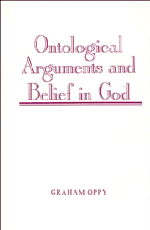Book contents
- Frontmatter
- Contents
- Preface
- Acknowledgments
- Ontological arguments and belief in God
- Introduction
- 1 Some historical considerations
- 2 Definitional arguments
- 3 Conceptual arguments
- 4 Modal arguments
- 5 Meinongian arguments
- 6 Experiential arguments
- 7 “Hegelian” arguments
- 8 Application to historical arguments
- 9 Are there (other) global objections to ontological arguments?
- 10 Is existence a predicate?
- 11 The uses of parody
- 12 Are ontological arguments of any use to theists and/or atheists?
- Conclusion
- Literature notes
- Bibliography
- Index
2 - Definitional arguments
Published online by Cambridge University Press: 05 May 2010
- Frontmatter
- Contents
- Preface
- Acknowledgments
- Ontological arguments and belief in God
- Introduction
- 1 Some historical considerations
- 2 Definitional arguments
- 3 Conceptual arguments
- 4 Modal arguments
- 5 Meinongian arguments
- 6 Experiential arguments
- 7 “Hegelian” arguments
- 8 Application to historical arguments
- 9 Are there (other) global objections to ontological arguments?
- 10 Is existence a predicate?
- 11 The uses of parody
- 12 Are ontological arguments of any use to theists and/or atheists?
- Conclusion
- Literature notes
- Bibliography
- Index
Summary
Consider the following arguments, which I take to be paradigmatic cases of definitional ontological arguments:
God is a being which has every perfection. (Definition)
Existence is a perfection. (Premise)
(Hence) God exists. (From 1,2)
God is an existent supremely perfect being. (Definition)
(Hence) God exists. (From 1)
It seems clear that there is no good reason for an agnostic to be persuaded by these arguments. Why not? First, it should be noted that these arguments can be paralleled to their detriment. Corresponding to the first argument, there are many arguments of the following form:
God* is a being that has all perfections except for moral perfections - and the moral attributes of God* are as follows:.… (Definition)
Existence is a perfection. (Premise).
(Hence) God* exists. (From 1,2)
And corresponding to the second argument, there are many arguments of the following form:
m is an existent Ϝ. (Definition)
(Hence) m exists. (From 1)
Thus, parallel to the second argument, there are arguments that purport to establish the existence of existent unicorns, existent round squares,and so on. And parallel to the first argument, there are arguments that purport to establish the existence of a vast range of distinct all-but-perfect beings. The existence of these parallels strongly Ontological arguments and belief in God suggests that there is something wrong with the thought that these arguments ought to be recognized by agnostics as sound proofs of the existence of God.
- Type
- Chapter
- Information
- Ontological Arguments and Belief in God , pp. 47 - 57Publisher: Cambridge University PressPrint publication year: 1996



